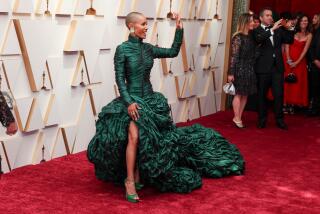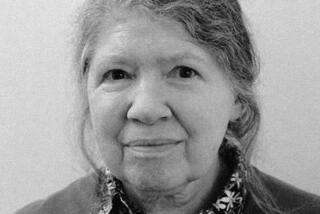Astaire’s Last Partner Copes With Life After Fred
- Share via
In 1980, Fred Astaire, who had been a widower since 1954 and who had just turned 81, married Robyn Smith, who was 35 and one of the first and most successful woman jockeys in the country.
“We were married on June 24, 1980,” Robyn Astaire said the other day, “and by a sad coincidence we buried him on June 24, 1987. But we’d had seven years of bliss. It was fate, absolutely; I know God put us together.”
She now lives alone in the handsome Astaire house in Beverly Hills, filled with mementos of his life and theirs--a painting of Fred’s fine horse, Triplicate, an HO gauge model train that sits on the cocktail table in the rather formal living room.
Astaire’s widow says she wants to honor his wishes and prevent the trivialization and commercialization of his name and his life’s work.
“Can you believe it?” she asks. “Someone sent me a life-sized cut-out of Fred in tails, with holes where the studs and the cuff-links would go. It was going to be a display to sell jewelry.” She was able to forestall that usage, she says.
Astaire was an intensely private man who was a charmingly difficult interview because he hated talking about himself, the past, his work and his partners, in approximately that order. That left horses, the weather and whatever immediate project he was involved with, like “Ghost Story,” his last feature, in 1981.
His wish for privacy extended beyond death. His burial was private and the terms of his will have never been made public. But Robyn Astaire says that it included a statement that having been so generously rewarded in his lifetime, he wished “no further plaudits.”
He didn’t like the fantasy sequence in the film “Pennies From Heaven” in which Steve Martin dances below a huge screen showing an Astaire-Rogers dance number, she says, and he was unhappy that Federico Fellini was calling a film “Ginger and Fred,” although the use was metaphoric.
“Fred left me in charge, so to speak,” she says. “He wanted me to protect him. He said he was tired of being used.”
They met on New Year’s Day in 1973, introduced by Alfred Gwynne Vanderbilt, for whom she was riding. “Fred bet on me and won,” she says, “and then I didn’t see him again for five years.” Then she was in Los Angeles filming a commercial and called him. They had dinner and, as in an Astaire movie, romance bloomed.
“I quit riding when we married. Fred said he didn’t want to live with all that anxiety.” She no longer rides, even recreationally (“That’s like driving an old VW after you’ve been used to roaring around in a Maserati”). She still runs and works out and is as slim (5 feet 7, 106 pounds) as in her racing days.
At the time of the marriage, news reports said that both Astaire’s sister Adele, who has since died, and his daughter Ada were opposed. Robyn Astaire avoids comment on the subject and says only that Astaire’s son, Fred Jr., is “my pal.”
They had almost no social life, she says, and preferred it that way. “We used to go to movies at noon, before the crowds came, and we could slip in and out. Then we would critique the movies. Fred never got used to the nudity and the swearing and the violence but he admired the acting.”
They talked until all hours, she remembers, and while he didn’t like to dwell in the past (“That’s done”), Astaire would talk about his life and his work because she was understandably interested.
“He said that when he was a boy he was always saying, ‘Oh, I hate that, I hate that, I hate that,’ whatever it was. Then one day his father shook him and said, ‘ Nothing makes you hate!’ Fred said he stopped saying it for years. In our time, once in a while he would say, ‘Oh, I hate that!’ with a little accent, like his father had, and it was funny.”
Astaire died of pneumonia, rather swiftly and without a lingering decline. “I think his life just ran its course. It’s devastating to see someone you love fade away, but thank God he didn’t suffer.”
Robyn Astaire says she won’t marry again. “It’s wonderful when people do, but I won’t. I’ve had my man.”
She has made herself the keeper of the flame, trying to sort out the exploitive uses of his name and work from the genuine honors that Astaire might, however reluctantly, have concurred in. (“He fought the AFI Life Achievement Award for years, but I said ‘You’ve got to give your friends a chance to say thank you for everything,’ and he was glad he did.”)
A law now exists that protects the name and image of the famous deceased. “Lawyers call it the 990 law, and thank heaven for it,” she says. But there still exists a shadowy area between the legitimate plaudits the world will be wanting to pay Fred Astaire for decades to come and the commercialization of his work.
She was upset at the use of his work in connection with the recent AFI Preservation Ball in Washington, not least because she had not been consulted, and neither she nor the Astaire children were invited until she made inquiries. But the fund-raiser was successful and it was a cause--film preservation--that Astaire would probably have endorsed.
“I’m just trying to protect my husband,” Robyn Astaire says: “What he wanted, what he didn’t want. I’ll do everything I can to carry out his wishes. I hope it doesn’t make me look bad or seem like a power trip. But if it does, so be it.”
More to Read
Only good movies
Get the Indie Focus newsletter, Mark Olsen's weekly guide to the world of cinema.
You may occasionally receive promotional content from the Los Angeles Times.








